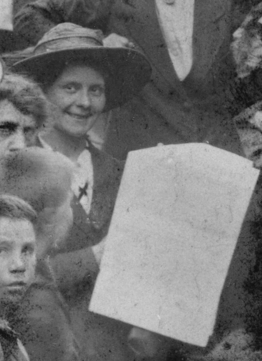 Nellie Cressall was born in Stepney in 1882, and worked in a Whitechapel laundry from her teens. She married George Joseph, and together they had six children.
Nellie Cressall was born in Stepney in 1882, and worked in a Whitechapel laundry from her teens. She married George Joseph, and together they had six children.
In 1907 Nellie joined the Independent Labour Party, and remained active in the Party all her life.
Suffragette and Rates Rebel
After meeting Sylvia Pankhurst in 1912 Nellie joined the east London suffragettes, saying:
I had been thinking for some time of the unequal rights of men and women. I could not agree that men should be the sole parent, that a mother could not even say whether her child should be vaccinated or not – or that women should receive half pay and many other things as well. I thought that here is something I can dedicate myself to to help in some way to put things right.
Like many of the East London Federation of the Suffragettes Nellie was a pacifist and opposed the First World War. And like her fellow suffragettes Minnie Lansbury, Julia Scurr, and Jennie Mackay Nellie was one of the Poplar Rates Rebels of 1921.
Mayor and Labour Party activist
After the Poplar rebellion Nellie Cressall continued her work as a Labour Party activist, becoming Mayor of Poplar in 1943.
In 1951, when Nellie was 69 years old (with 26 grandchildren and eight great-grandchildren!) she delivered a speech at the annual Labour Party Conference in Scarborough, defending the great strides in living conditions which Labour had brought about since the First World War:
Years ago after the First World War many, many people in my constituency sat in the dark because they had not got a penny to put in the gas. Today what do I find? People come to me creating about the heavy electricity bills they have to pay!... I have young people coming worrying me for houses.... We have got some houses where six families lived once upon a time.... Whereas in the old days people would get married, as I did, and be contented in two nice little rooms, today our young people want a home of their own.
Her speech “roused the audience to prolonged applause and cheering” and drew praise from Aneurin Bevan, who said her speech was the finest at the conference.
Sources
- The Home Front, Sylvia Pankhurst
- The Suffragette Movement, Sylvia Pankhurst
- Guilty and Proud of it!, Janine Booth
- Voices from History: East London Suffragettes, Sarah Jackson and Rosemary Taylor
- Letters of Gold, Rosemary Taylor
- Spartacus Educational - Nellie Cressall
- Wikipedia - Nellie Cressall

